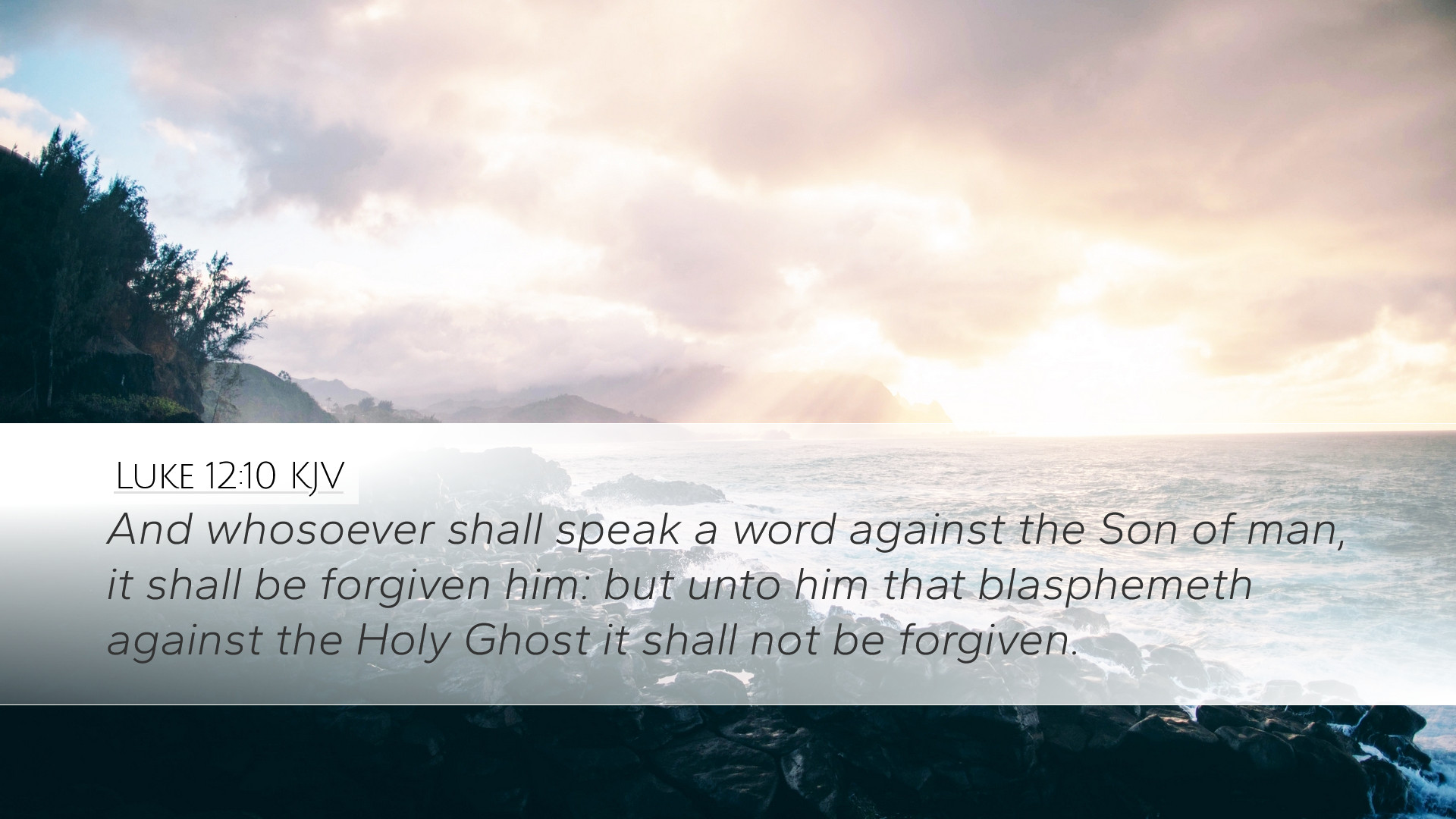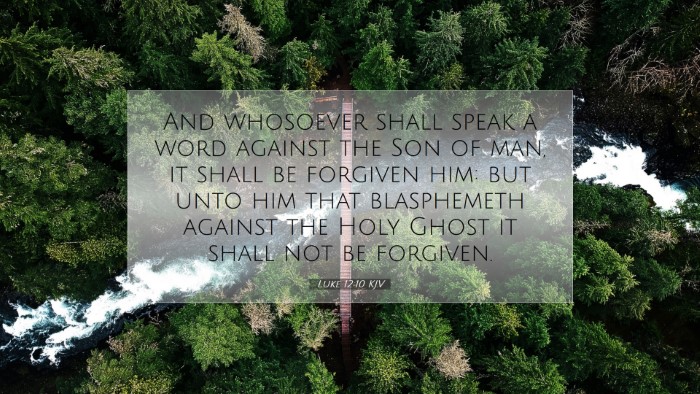Commentary on Luke 12:10
Luke 12:10 states:
“And everyone who speaks a word against the Son of Man, it will be forgiven him; but to him who blasphemes against the Holy Spirit, it will not be forgiven.”
Overview
This verse is a profound statement made by Jesus, situating the teaching within the larger context of His ministry. Commentaries by noted theologians such as Matthew Henry, Albert Barnes, and Adam Clarke provide rich insights into its theological implications. Let us explore the multifaceted interpretations of this significant verse.
Key Themes
- The Unforgivable Sin: The distinction between blasphemy against the Son of Man and blasphemy against the Holy Spirit is crucial.
- Forgiveness: The assurance of forgiveness associated with speaking against Christ highlights His gracious nature.
- Theological Implications: This verse raises questions about the nature of sin and the work of the Holy Spirit.
Commentary Insights
Matthew Henry's Commentary
Matthew Henry emphasizes the gravity of blasphemy against the Holy Spirit, noting that it represents a conscious and willful rejection of the truth revealed by the Spirit. He suggests that while one may speak against Christ in ignorance or weakness, the deliberate act of rejecting the leading of the Holy Spirit indicates a hardened heart. Henry notes:
“Those who speak against Christ may be misled but can find forgiveness, whereas turning away from the Holy Spirit is a definitive act that seals one’s fate.”
Albert Barnes' Commentary
Albert Barnes provides an analytical lens on this verse by distinguishing between the roles of the Son and the Holy Spirit within the Trinity. He asserts that while the Holy Spirit actively convicts and leads individuals to Christ, to reject Him is to reject the very means of grace. Barnes states:
“The sin against the Holy Spirit may be understood as a rejection of the truth by those who have fully comprehended its power.”
This understanding elucidates the severity of categorizing one's disobedience, highlighting that knowledge and resistance amplify accountability.
Adam Clarke's Insight
Adam Clarke interprets this verse as a warning to those who are indifferent to the divine work of the Holy Spirit. He encourages believers to maintain an attentive heart towards the Spirit's work in their lives. Clarke posits:
“Blasphemy against the Holy Spirit indicates an opposition to the truth of God, reflecting a heart that has rejected divine illumination.”
He also mentions that understanding the context of Jesus' ministry helps in discerning this critical aspect of faith.
Theological Implications
The concept of unforgivable sin raises vital theological discussions surrounding grace, repentance, and the nature of sin. The forgiveness offered through Christ contrasts sharply with the impossibility of forgiveness for those who blatantly turn away from the Holy Spirit.
Soteriology and Blasphemy
In examining soteriology, it is essential to understand that forgiveness is available for all who turn to Christ, yet the rejection of the Spirit's work in bringing one to repentance manifests a spiritual state that remains in darkness.
The Role of the Holy Spirit
As highlighted in the commentaries, the Holy Spirit plays a fundamental role in the believer's life, convicting, guiding, and affirming one's faith. Those who resist this divine influence are, in effect, sealing their fate through a conscious act of dismissal.
Practical Applications
For pastors, students, and theologians, this verse holds significant teaching and practical applications:
- Awareness of Sin: Encourage self-examination of one's heart in relation to the Holy Spirit's promptings.
- Redemptive Conversation: Foster dialogues about grace, emphasizing the unceasing availability of forgiveness through Christ.
- Teaching on the Holy Spirit: Provide biblical instruction on the operation of the Holy Spirit in the believer’s life, highlighting its necessity for effective ministry.
Conclusion
Luke 12:10 serves as a powerful reminder of the delicate dance between grace and rejection. The insights provided by the commentaries of Matthew Henry, Albert Barnes, and Adam Clarke deepen our understanding of this verse, inviting reflection upon our responsiveness to the Holy Spirit's call. As we engage with this text, may our hearts remain open to the truth and transformative power of the Gospel.


